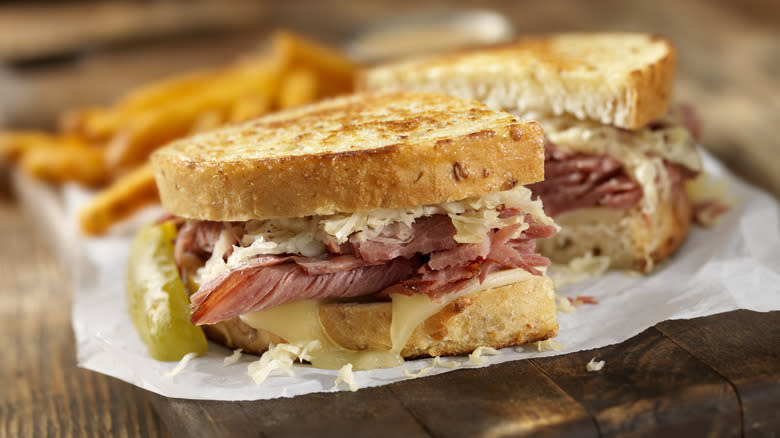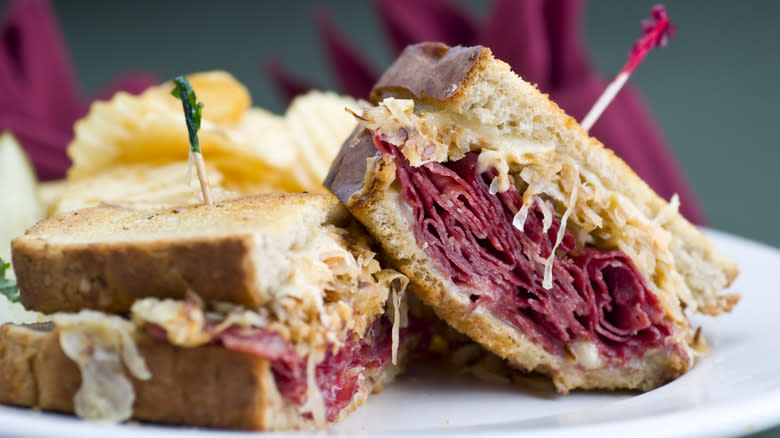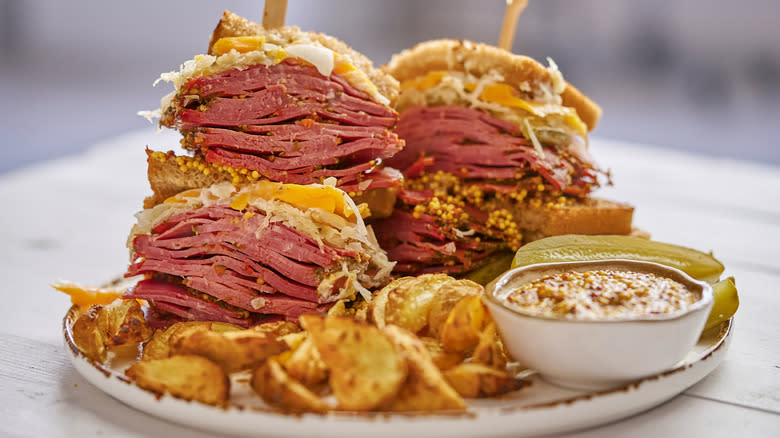The Classic Reuben Sandwich Was Named After A Real Person

When you are trying to decipher a menu to decide what exactly you want to order, your decision can be even more complicated if the product names on the menu have nothing to do with their ingredients. Let's just say we are thankful whenever these types of establishments include pictures. There are, however, a few classic foods that anyone can identify by name alone. The Big Mac, for example, was named in honor of the company's legendary name, McDonald's. Caesar salad is another food named after its creator, although it might not be the Caesar you're thinking of. A Reuben sandwich is another example of a tasty delicacy that shares its title with the name printed on many birth certificates.
Sometimes, we wonder which came first: The dish or the name? In the case of the iconic corned beef sandwich topped with melted Swiss cheese, sauerkraut, and Thousand Island dressing, it was named after a sandwich lover named Reuben. According to The Bump, the name Reuben derives from the Hebrew language, loosely translated to "behold, a son." In some ways, the definition is extremely fitting for the man called Reuben, who inspired the classic deli sandwich.
Read more: 11 Things You Didn't Know You Should Be Doing With Bacon
This Exact Origin Of The Tasty Sandwich Is Not Known For Certain

According to Omaha, Nebraska folklore, we all have one man to thank for the tasty Reuben sandwich: Reuben Kulakofsky. He was known for bringing a rather unique sandwich made of corned beef and sauerkraut to his poker nights at a local hotel. Apparently, the sandwich was such a hit that the hotel's owner wanted to offer the sandwich at his establishment, telling his son in the kitchen to whip up a Reuben for Reuben. Seeing how incredible this sandwich could be, the son included the additional cheese and dressing; the rest is history.
However, some historians have brought up that the Reuben could actually be a New York sandwich, claiming it as one of the many things the city's delis invented during the early 1900s. In an aptly named restaurant called Reuben's Restaurant, owner Arnold Reuben was known to serve up this iconic sandwich. In all alleged origin stories, the sandwich was named after someone either way, although the exact origins are still widely up for debate. These days, people worldwide enjoy a classic Reuben sandwich, especially during St. Patrick's Day, thanks to its combination of distinctly Irish foods.
To Make An Authentic Reuben, You Need All Of The Right Ingredients

All too often, a Reuben gets confused with other sandwiches that have similar ingredients. All Reubens are corned beef sandwiches, but not all corned beef sandwiches are Reubens. In order to call this iconic sandwich by its name, there are a few key ingredients that must be present. First, it is important to distinguish that a Reuben is stacked high with only sliced corned beef. Combining meats such as turkey or pastrami would no longer classify it as a Reuben. This combination has another name: The Rachel. While that may be a close relative to the Reuben, the meat alternatives make it a distinctly different sandwich. The type of bread you use also makes a difference. If you reach for a sweet Cuban roll rather than the traditional marbled rye bread, you begin to enter Cubano territory. Finally, there are only two types of acceptable dressing: Russian or Thousand Island.
Many sandwich enthusiasts will argue that, by definition, using any other type of bread, cheese, or dressing will remove the title of Reuben from your sandwich concoction. You may also lose that title if you ask for the sandwich sans sauerkraut. While you may have crafted a tasty sandwich, it is not a classic Reuben unless it checks all the boxes.
Read the original article on Daily Meal.

